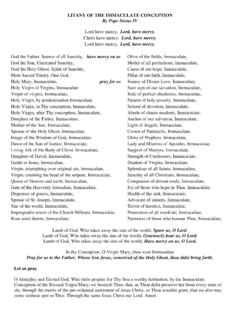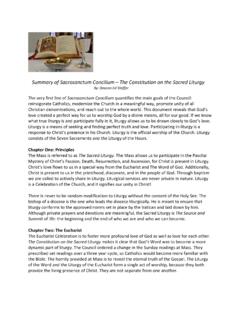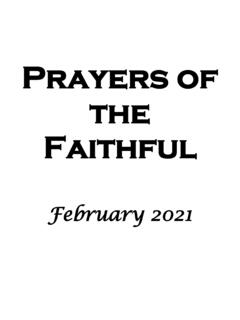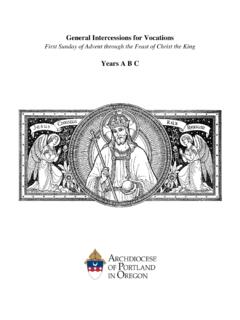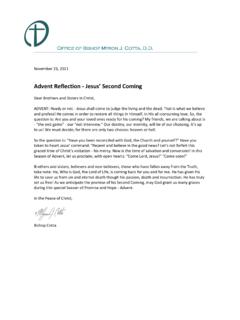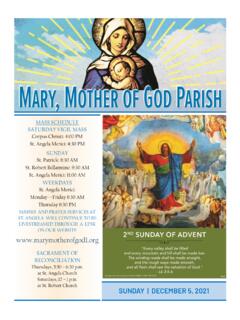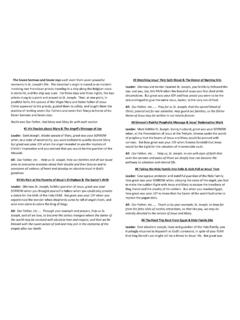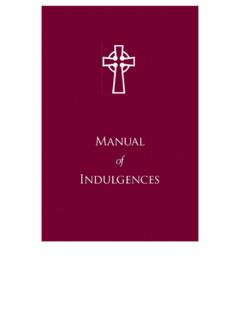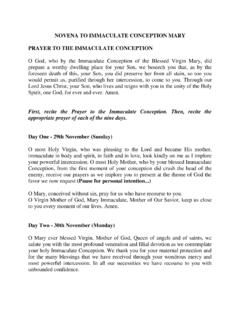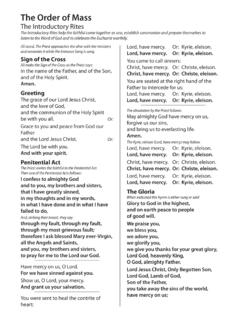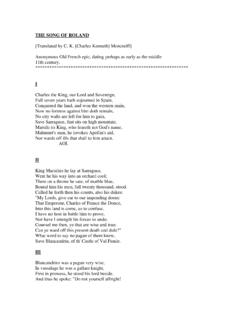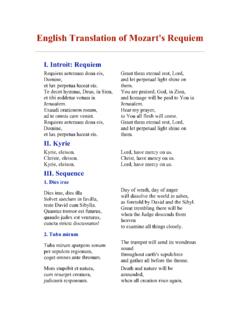Transcription of The Penitential Rite I
1 Preparing for the New Translation The Penitential Rite I n the order of the Mass, the Penitential Rite follows the greeting. The Roman Missal provides for several op-tions here from which the priest is free to choose. Penitential Rites Sprinkling Rite: The blessing of holy water and the sprin-kling of the faithful as a reminder of their Baptism is most fittingly used during the Easter Season but may rightfully be used at other times. Given the length of the prayers in-volved and its infrequent usage, however, we will skip over this option. Each of the other Penitential Rites begins with an introduc-tion by the Priest. Commentary When we approach the Holy Sacrifice of the Mass, we enter into Christ s unique self-sacrifice on the Cross and his victo-ry over sin and death, the Paschal Mystery. This is an entry into the holiest of actions, and as Proverbs 24:16 re-minds us The just man falls seven times a day.
2 All sin damages our relationship with God, and, in the case of mortal sin, it severs that relationship of friendship. The Penitential rite offers forgiveness for all venial sin. The Penitential rite is not a substitute for the confession for mortal sin (the willful and knowledgeable violation of God s law concerning a some-thing of a serious nature), which we are required to confess and receive penance and absolution. The single option in the New Translation, which follows the only introduction given in the official Latin text, is closest to option C in the Current Translation. The Order of the Mass then continues: Preparing for the New Translation by Fr. Allen Moran, OP. Copyright 2011 Dominican Fathers, Province of St. Joseph To support the work of the Dominican Friars, send contributions to: Dominican Foundation, 141 East 65th Street, New York, NY 10065 Current Translation New Translation Then the priest, facing the peo-ple, extends his hands and greets all present with one of the following greetings: A.
3 As we prepare to cele-brate the mystery of Christ s love, let us acknowledge our fail-ures and ask the lord for pardon and strength B. Coming together as God s family, with con-fidence let us ask the Father s forgiveness, for he is full of gentleness and compassion. C. My brothers and sisters (friends, dearly beloved, brethren, et al), to pre-pare ourselves to cele-brate the sacred myster-ies let us call to mind our sins. Then follows the Penitential Act, to which the Priest invites the faithful, saying: Brethren (brothers and sisters), let us acknowledge our sins, that we may prepare ourselves to celebrate the sacred mys-teries. Current Translation New Translation A pause for silent reflection follows. After the silence, one of the follow-ing three forms is chosen: I confess to almighty God and to you, my brothers and sisters, that I have sinned in my thoughts and in my words, in what I have done and in what I have failed to do, They strike their breast: through my fault.
4 And I ask the Blessed Vir-gin Mary, all the Angels and Saints, and you, my broth-ers and sisters to pray for me to the lord our God. A brief pause for silence follows. Then all recite together the formula of general confession: I confess to almighty God and to you, my brothers and sisters, that I have greatly sinned in my thoughts and in my words, in what I have done and in what I have failed to do, And, striking their breast, they say: through my fault, through my fault, through my most grievous fault; therefore I ask blessed Mary ever-Virgin, all the Angels and Saints, and you, my brothers and sisters, to pray Commentary In the New Translation, we see notice the addition of sever-al items found in the official Latin texts but omitted in our Current Translation. There is a greater reflection of the Lat-in prayer s teaching on the sinfulness of mankind, of our personal responsibility before God for our actions, and a greater recognition of our need for mercy.
5 The absolution of the priest follows the I confess . Alternatively, following the brief moment of silence, the following Penitential Rite may be chosen: The priest then gives the absolution listed above with the People responding, Amen. Commentary This option for the Penitential Rite now reflects the ap-proved Latin text much more faithfully. Notice that the first People s response has changed entirely. Following the I confess or the Have mercy on us options for the Peni-tential Rite, a series of Kyrie eleison-Christe eleison-Kyrie eleison (or their English equivalents: lord , have ) are sung Current Translation New Translation The priest says the absolution: May almighty God have mercy on us, forgive us our sins, and bring us to everlasting life. The people reply: Amen. The absolution of the Priest follows: May almighty God have mercy on us, forgive us our sins, and bring us to everlasting life.
6 The people reply: Amen. Current Translation New Translation The priest says: lord , we have sinned against you: lord have mercy The people answer: lord , have mercy. Priest: lord , show us your mercy and love. People: And grant us your salva-tion. The Priest then says: Have mercy on us, O lord The people answer: For we have sinned against you. Priest: Show us, O lord , your mercy. People: And grant us your salva-tion. or said. Here we find the last part of the Mass that is still preserved in Greek, the common language for the Mass even in the West before it switched to Latin in the third or fourth century. This is sung or recited by the deacon, if present, or by the priest, or, if sung, intoned by the cantor. The faithful respond to each invocation. The final option for the Penitential Rite, following the brief moment of silence, involves a series of invocations lead by the priest, a deacon, or another suitable minister.
7 These may be sung or recited. They end with Kyrie eleison or its English equivalent: lord , have mercy. The priest then gives the absolution listed above and the faithful respond, Amen. Commentary Only the deacon/priest s part of the final invocation chang-es in the new translation and this not substantially. The change, however, brings out the Biblical sense of the power that comes from being seated at the right-hand of the King. This is the language that St. Paul uses to describe the glory the Risen Christ has received and from which He makes his intercession for us to the Father (cf. Eph. 1:19-20; Col. 3:1; Heb. 1:3). Current Translation New Translation V: Kyrie eleison R. Kyrie eleison V. Christe eleison R. Christe eleison V: Kyrie eleison R. Kyrie eleison V: Kyrie eleison R. Kyrie eleison V. Christe eleison R.
8 Christe eleison V: Kyrie eleison R. Kyrie eleison Current Translation New Translation Deacon: You were sent to heal the contrite, Kyrie eleison People: Kyrie eleison Deacon: You came to call sinners, Christe eleison People: Christe eleison Deacon: You plead for us at the right hand of the Fa-ther, Kyrie eleison People: Kyrie eleison. Deacon: You were sent to heal the contrite, Kyrie eleison People: Kyrie eleison Deacon: You came to call sinners, Christe eleison People: Christe eleison Deacon: You are seated at the right hand of the Fa-ther to intercede for us, Kyrie eleison People: Kyrie eleison.
